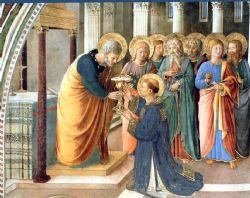On Christmas Day, I was among family holding my youngest grandson, Simon Thomas, having a peaceful moment with him amid the cacophony of what are our usual gatherings. Simon was, at the time, just past his 2nd month birthday. Totally unaware of the intimacy I experienced, he was peacefully asleep on my crossed knee, his face reflecting a smile as he enjoyed his nap. My maternal grandmother called these “angel smiles.”
Holding Simon, I appreciated the magnanimity of his life that this point in time. His birth reflects to me an act of faith undertaken by his father (our son, Thomas) and his mother (our daughter-in-law, Nicole). Marriage and starting a family are not the 21st century norm for young people in their mid-20s. Statistics tell us that, increasingly, young adults do not choose marriage until their mid-thirties or later, if at all. My son and his wife are blessed to be among a group of courageous young married adults, tackling parenthood in a time when many reject it temporarily or permanently. I rejoiced in that quiet moment with God and with Simon at the courage of his parents, and other parents like Simon’s, in their cooperation with faith that brings about new life like his.
I considered Simon’s innocence, and his dependence on his mother for the basics of nutrition (and much more!); and on both his parents for warmth, security, and love. I admired for Nicole in her sacrifice for her son, not at all unlike the sacrifice I witnessed in my wife, Ginny, as she nurtured our children in infancy. I was deeply moved by the whole encounter with Simon even as I experienced the peripheral antics of older grandchildren. It wasn’t more that a few minutes. I pondered the devotion of young parents – our children and their spouses - to raising their families. Marriage and parenting are challenging at any time, but in today’s culture, it seems especially so.
Privileged to hold each of my grandchildren in their earliest days, each encounter was memorable. Here, smitten with Simon, I sensed the rush of God’s grace upon me and upon our family. My wife and I are blessed with thirteen grandchildren. I had a “God-moment.”
The very next day, I read an article written for The Catholic Thing by Fr. Paul Scalia (son of former Supreme Court Justice, Antonin Scalia) on the Feast of the Holy Family. “The Pilgrim Family” addressed important attributes of family, especially a family modeled after the Holy Family which, Fr. Scalia asserts, is not only realistic but the Holy Family provides the perfect example to be modeled. I wish I could say that we had been entirely intentional about modeling the Holy Family. That’s another story. Suffice it to say, our children appear to be doing much better at it. Scalia identifies focus, purpose, and direction in life, all traits of the Holy Family. Though materially poor, the Holy Family was spiritually rich, parents possessing a healthy sense that the life to come is far more important than earthly existence now.
Our Blessed Mother began preparing for her Son’s vocation even before His birth. This is perhaps among the most significant of her actions for us to consider as we move through an age in which the paramount purpose of family lies in the supernatural – the handing on of the faith.
Fr. Scalia wrote, “It is increasingly necessary for us, in our culture, to recall this supernatural purpose of the family. The necessities and benefits the family once provided an individual (financial security, physical security, education, etc.) the state now provides (or promises, anyway). Rightly or wrongly, we don’t rely on the family for those things anymore. It’s now clearer that the family provides what no one else can: a place where Christ is learned, worshipped, and lived. In short, the domestic church.”
Our work in Serra is focused on vocations: we pray for the vocational call to holiness given to each of us; we pray for priestly and religious vocations in the Church; we pray for healthy and holy marriages for ourselves (those of us married) and our children and grandchildren called to the Sacrament of Matrimony.
Our Serran purpose is to help one another in living out God’s call in our lives, even while we devote our prayer to vocations and contribute materially to the support of vocations in the Church, assisting those who, in answering their vocational call, accept a life of poverty, chastity, and obedience. Serra is a place where the family – the primary domestic church – can find strength and support; Serra is a secondary domestic church.
I became aware, during my quiet reverie with Simon on this memorable past Christmas day, of the privilege I have as his “YeYe” (our grandchildren call me “YeYe” – Chinese for “grandpa” – another story in itself. . .) to pray for his vocation, pray for his parents’ marriage vocation, and pass along the gift of faith that I have been given. With God’s help, it will happen. The interdependency of vocations became clear as I later read Fr. Scalia’s essay about the pilgrim family on the Feast of the Holy Family. Solid marriages are based on a relationship centered on Christ. I thanked God for the gifts of the faithful priests and religious sisters who touched my life and the life of my family, helping us along our journey, keeping us centered. Priestly and religious vocations are rooted in the faith life of the family – the domestic church – as imperfect as it may at times be. It is out of the domestic church that God calls laborers to serve in His vineyard, the greater Church.
The Holy Family pilgrimage to Jerusalem, a caravan migrating for the Feast of Passover, foretells our pilgrimage journey to heaven. Our purpose is to get there and to help one another along the way. In its Prologue, the Catechism of the Catholic Church defines our purpose, to know and love God:
“God, infinitely perfect and blessed in himself, in a plan of sheer goodness freely created man to make him share in his own blessed life. For this reason, at every time and in every place, God draws close to man. He calls man to seek him, to know him, to love him with all his strength. He calls together all men, scattered and divided by sin, into the unity of his family, the Church. To accomplish this, when the fullness of time had come, God sent his Son as Redeemer and Savior. In his Son and through him, he invites men to become, in the Holy Spirit, his adopted children and thus heirs of his blessed life.”
Fr. Scalia said in his article, “Purpose . . . brings perseverance. If you’re uncertain about your destination, you’re not likely to continue striving for it. A pilgrim without a destination is no longer a pilgrim.” Once the vision is lost, the will is diminished.
Encountering my sleeping cherub grandson on Christmas Day, I considered Simon’s birth the birth of a vocation, the first time such a thought about a child’s birth occurred to me. It is, nonetheless, true. Parents and grandparents (the domestic church), while unable to know a child’s vocation a priori, assume the responsibility of cultivating the child’s response to whatever vocational call God reveals in time. Parents give a child tools and preparation to recognize God’s call and respond when a vocation call is realized.
Scripture tells us that God does indeed have a plan for us. “For thus says the Lord: I know well the plans I have in mind for you—oracle of the LORD—plans for your welfare and not for woe, so as to give you a future of hope.” (Jer 29:10-11) His plan is laid for us before we are born. “Before I formed you in the womb I knew you.” (Jer 1:5)
While Simon may not know his vocation, and his YeYe may not know Simon’s vocation, I am privileged to pray for both Simon and his vocation, and to assist his parents in assuring that the faith I know becomes part of Simon’s experience.
I do hope (and anticipate fully) that Simon will be much quicker on the trigger than his YeYe in realizing important things in life. The birth of a child is the birth of a vocation. I don’t know why the understanding eluded me for so long.
The domestic church isn’t meant to stand alone. It is meant to be strengthened and supported by God’s extended family, the pilgrim Church. I am delighted that Serra is a part of the pilgrim Church and even more delighted to be part of Serra. It is great vehicle of support, Catholic Christian friendship, and strength for the journey. Children, like Simon, benefit immeasurably. So does this YeYe.




